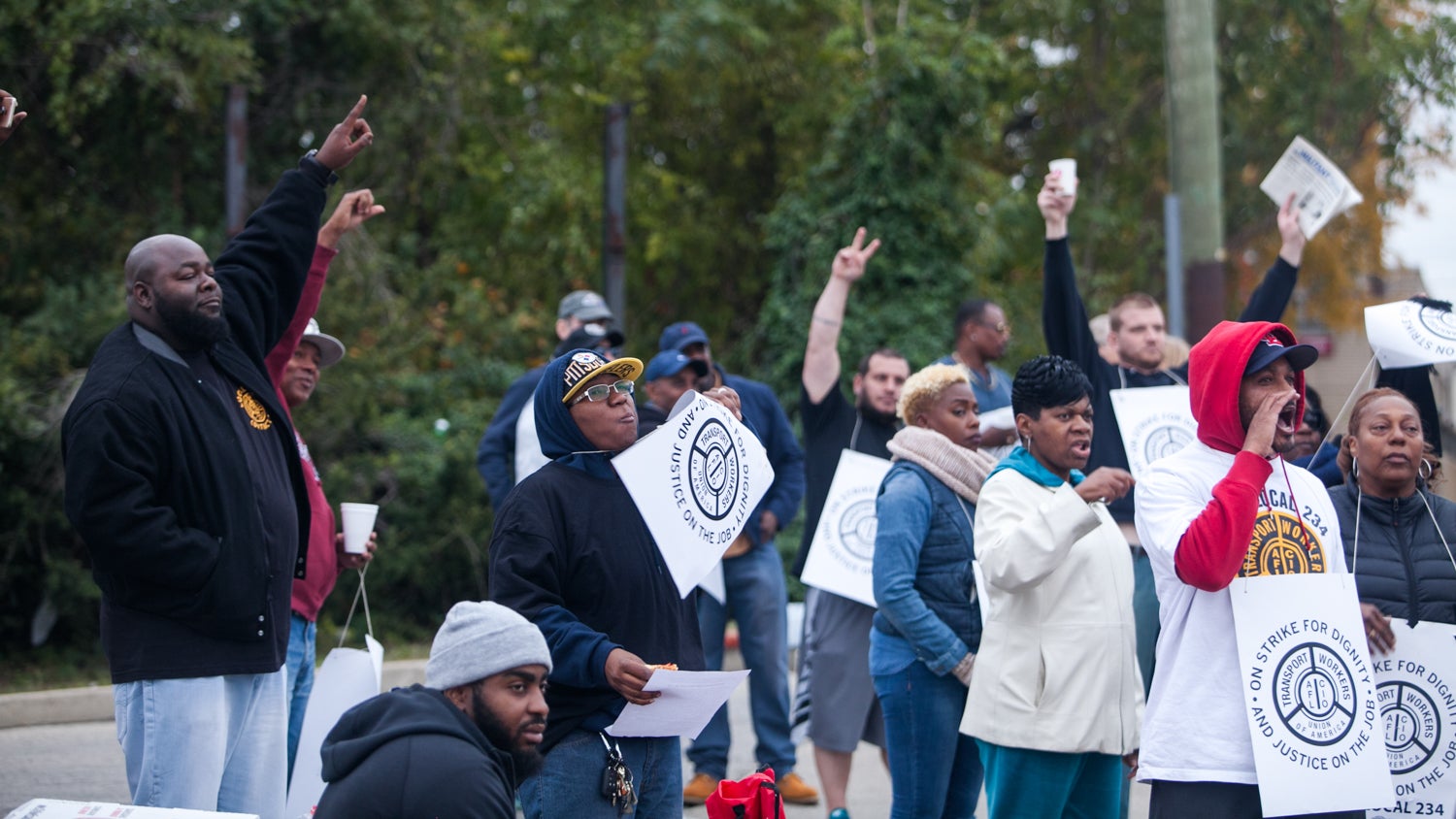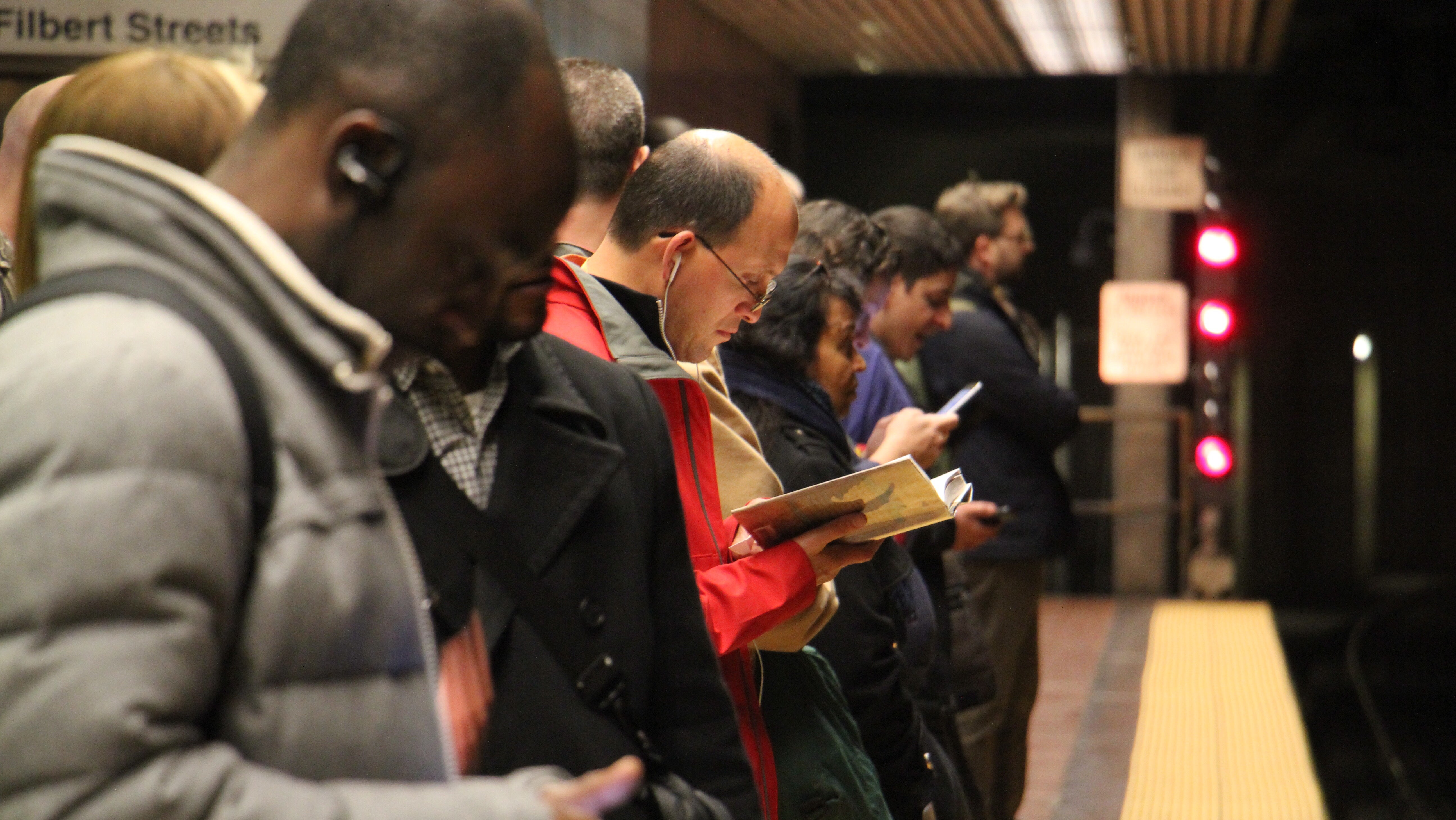SEPTA strike negotiations stall as management, union await Monday court hearing

Elections and strikes can make for strange bedfellows. With Election Day looming and a transit strike ongoing, Pennsylvania’s Democratic governor and Philadelphia’s Democratic mayor are backing SEPTA management’s attempt to end the Transport Workers Union Local 234 work stoppage with a judicial injunction.
Talks to end the lingering strike continued over the weekend. But with a hearing scheduled for Monday morning that could suspend the walkout for Election Day, both SEPTA and the union seemed unwilling to negotiate in earnest until a court ruling gives one side the upper hand.
On Friday afternoon, SEPTA sought an injunction to end the work stoppage—not just suspend it on Tuesday. Judge Linda Carpenter rejected SEPTA’s request, saying that its lawyers failed to present enough evidence of an immediate, ongoing harm to the public. But Carpenter tabled arguments over the strike’s potential impact on voting until Monday, saying it would be premature to issue an injunction when a settlement could be made over the weekend.
On Sunday afternoon, union lawyer Bruce Bodner said that SEPTA had no reason to present a serious offer and try to make a deal, not with the hearing pending Monday. Eating alone at the Sheraton hotel bar while checking emails on his phone, Bodner seemed resigned to another night of ultimately futile back-and-forth with SEPTA through the state mediator.
Sunday evening, Gov. Tom Wolf announced he would file an amicus brief supporting SEPTA’s attempt to suspend the strike. About an hour later, Mayor Jim Kenney made a similar announcement, but stressed that he was supporting an injunctive court order “for Election Day only.”
Gov. Wolf wasn’t so circumspect in his release made no mention of Election Day. “Due to the inability of SEPTA and TWU to reach a compromise, I will file an amicus brief in support of the immediate injunction pending before the court to ensure that the system is fully operational and able to serve the individuals who rely solely on SEPTA for their transportation needs,” he wrote.
On Friday night, TWU Local 234 President Willie Brown issued a statement lambasting SEPTA’s attempted reliance on the courts. “We can’t get anywhere at the bargaining table because SEPTA has pinned their hopes on getting an injunction to end the strike,” read the statement. Brown accused SEPTA of using the election for leverage.
Nan Lassen, who successfully represented TWU on Friday in court, told PlanPhilly earlier in the week it was the union who gained bargaining strength from the election. “They have enormous leverage going on strike reasonably in advance of a large public election because that gets the public actors—not just the public inconvenienced by the strike, but the actors in Harrisburg, City Hall and the Legislature—into the game,” said Lassen.

All eyes will be on Judge Carpenter Monday morning.
SEPTA will be making an argument nearly identical to the one it presented Friday. Under the Public Employe Relations Act, a court can force striking public-sector workers back to work if there is “a clear and present danger or threat to the health, safety or welfare of the public.” On Friday, Carpenter said SEPTA failed to present enough evidence of immediate harms.
SEPTA has some precedent to rely on—in 1992, Pittsburgh Mayor Sophie Masloff successfully sued to end a Port Authority of Allegheny County strike that lasted 28 days. In that hearing, Pittsburgh’s attorneys presented 30 witnesses who testified on the work stoppages’ impact on their lives. “Blind, epileptic, professional, student, and blue-collar witnesses testified about the effect of the lack of public transportation upon their lives. While the lack of such transportation is a matter of inconvenience for some, it is devastating to others,” wrote Justice Stephen Zappala in a decision upholding the injunction.
SEPTA’s attorneys from Buchanan Ingersoll & Rooney relied on just three SEPTA managers and the executive director of the Delaware Valley Regional Planning Commission to argue that the strike and the traffic it has caused kept high school students from getting to class, diabetics from dialysis appointments, and the disabled and poor from making all sorts of trips. TWU’s attorneys were able to poke enough holes in that testimony to stave off an injunction ending the strike. Judge Carpenter wondered aloud why SEPTA couldn’t bring in witnesses from the School District of Philadelphia to demonstrate that the strike was hurting attendance, which would demonstrate a danger to the public welfare.
With Gov. Wolf’s newfound support, SEPTA may try again to get a general court order to end the strike, period, and not just suspend it for Election Day. Joel Barras, a partner in Reed Smith’s labor law department, thinks that’s a harder ask, especially after Carpenter said no on Friday. Granting injunctive relief beyond Election Day effectively asks the court to call transit workers too essential to let strike, in the same way police, fire and corrections officers are.
“The Public Employee Relations Act has a provision that allows employer to go to court and seek injunctive relief in individual situations and the election would apply there,” Barras told PlanPhilly. “But the general idea that SEPTA operations are so critical to the operations of the city that they should be enjoined from striking, seems to be an attempt for judicial overreach.”
On Monday, the two sides will likely focus most of their arguments on the strike’s impact on the election.
Whereas SEPTA couldn’t show the immediacy required for a present danger on Friday, Judge Carpenter all but said it would exist when she heard arguments again on Election Day Eve.
The injunction’s grant will therefore hinge on whether Judge Carpenter believes that a transit strike would keep voters from the polls.
A transit strike’s impact on voting isn’t clear. Turnout was actually up slightly in 2009, the last time Brown’s union picketed on an Election Day. But the District Attorney’s race topped the ballot that year, making it difficult to draw comparisons. In 2009, a total of 120,000 Philadelphians voted. Democratic nominee Hillary Clinton alone hopes for something closer to the 588,000 voters that President Barak Obama received in 2012.
Philadelphia votes overwhelmingly for Democrats, who are nervous about the transit strike’s impact on turnout. There are seven registered Democrats for every one Republican in the city, and the party hopes for a 460,000-vote margin out of Philly. Longer commute times caused by a transit strike could make it difficult for some voters, including suburban residents who commute into the city, to make it to the polls, which will be open from 7 a.m. to 8 p.m. Tuesday.
A Clinton Super PAC has announced that it will pay for Uber and Lyft rides to the polls Tuesday, and voters will be able to rent vehicles through Zip Car for free as well. Philadelphia’s building trade unions also promised to provide rides to the polls because of the strike.
Even if SEPTA wins an injunction for Election Day, that won’t necessarily bring an end to commuters’ woes. “The union still has the tremendous leverage of a strike following an election,” said Barras. “You still have the tremendous number of riders who have to get to and from work or two and from school.”
WHYY is your source for fact-based, in-depth journalism and information. As a nonprofit organization, we rely on financial support from readers like you. Please give today.



